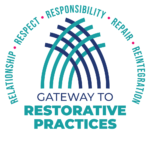
Restorative Practices are a time honored and relationally based methodology of restoring and revitalizing broken relationships. Given the events of recent years, it is clear, now more than ever, that our systems and philosophy to restore must be re-evaluated and renewed in a manner that promotes honest, caring, and transparent relationships. Where better to start than in our schools.
The Restorative Practices Continuum offers strategies ranging from prevention to intervention. These time-tested tools are offered in a variety of formats located on this page.
Ideally, all staff in a school district are trained in Restorative Practices, but costs prohibit many districts from this approach. Over a decade ago, Dr. Fritzemeier and colleagues began offering a popular Restorative Practices in Schools alternative. Districts strategically select school sites and then create leadership teams for each site that include administrators, classified staff, and certificated staff as each offers a sphere of influence.
Training is based on a multiple-tiered systems of support (MTSS) using a Restorative Practices continuum that ranges from informal processes to formal processes; from proactive to responsive; and from prevention to intervention. Site teams collaborate and develop their site’s implementation plan during innovative and interactive multi-modality training that includes functional tools and practice.
Looking for more comprehensive Restorative Practices training beyond workshops? These two, six-hour seminars offered on selected Saturdays may be just what you’re looking for.
Gateway to Restorative Practices offers workshops for those new to Restorative Practices in our introductory workshops. If you have some Restorative Practices background, an intermediate workshop may fit best. Have you been doing this for a while? Check out our advanced workshops. The workshop level is identified after each workshop title.
Have you heard that restorative circles can be implemented with elementary and secondary students, as well as staff? Do you know that there are different kinds of circles? Circles may be proactive or responsive. Whatever you need, Gateway to Restorative Practices has you covered!
Would you like your scholars to learn about Restorative Practices? View the workshops offered for scholars.
Some educators prefer on-line training as opposed to in-person training. A select number of workshops that are not offered in-person are offered though a school district’s professional development. Each workshop includes a video with instructions to stop and complete the activities. Workshop handouts feature content, activities, and resources.
| Sun | Mon | Tue | Wed | Thu | Fri | Sat |
|---|---|---|---|---|---|---|
|
1
|
2
|
3
|
4
|
5
|
6
|
7
|
|
8
|
9
|
10
|
11
|
12
|
13
|
14
|
|
15
|
16
|
17
|
18
|
19
|
20
|
21
|
|
22
|
23
|
24
|
25
|
26
|
27
|
28
|
|
29
|
30
|
31
|
1
|
2
|
3
|
4
|
Get Your Free Download
11 Restorative Practices De-escalation Techniques for Navigating Power Struggles
Discover practical techniques you can implement right away.
As a subscriber to this email list, you will receive bi-weekly blog posts from Gateway to Restorative Practices.